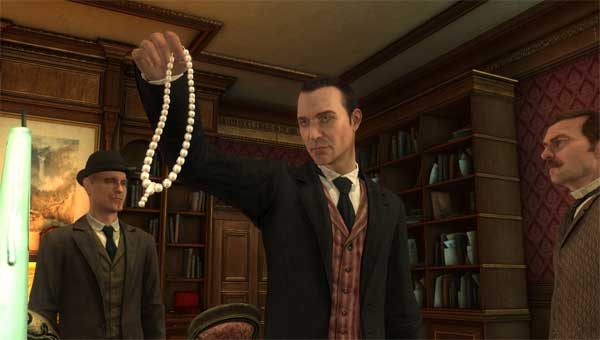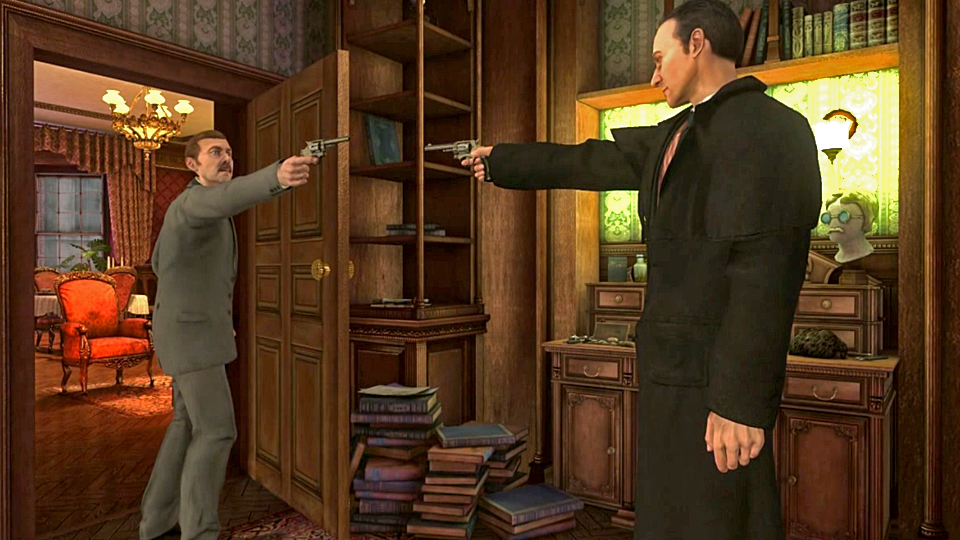Search
[{{{type}}}] {{{reason}}}
{{/data.error.root_cause}}{{{_source.title}}} {{#_source.showPrice}} {{{_source.displayPrice}}} {{/_source.showPrice}}
{{#_source.showLink}} {{/_source.showLink}} {{#_source.showDate}}{{{_source.displayDate}}}
{{/_source.showDate}}{{{_source.description}}}
{{#_source.additionalInfo}}{{#_source.additionalFields}} {{#title}} {{{label}}}: {{{title}}} {{/title}} {{/_source.additionalFields}}
{{/_source.additionalInfo}}- Details
- Category: Xbox 360
- By Nate DaZombie
- Hits: 6534
The Testament of Sherlock Holmes (Xbox 360)

The Testament of Sherlock Holmes
Developed By: Frogwares
Published By: Atlus
Released: September 25, 2012
Available On: Microsoft Windows, PS3, Xbox 360
Genre: Adventure
ESRB Rating: M for Mature: Blood and Gore, Intense Violence, Use of Drugs
Number of Players: Single-player only
Price: $24.99 new, $19.99 used
Despite my last experience with Frogwares’ take on the famous Sherlock Holmes, I’d be lying if I claimed to be indifferent about their newest release. Their last console release, Sherlock Holmes Verses Jack The Ripper, was an incredibly flawed adventure game that wowed me with its excellent, thought-provoking story and irritated me to no end with its frustratingly difficult puzzles. It seems reviewers’ grievances were taken to heart though, as Frogwares admitted their mistake in creating the puzzles for Jack the Ripper and took great strides in making the game more accessible.
To start with, most puzzles now require basic logic skills instead of the absurd, “how the deuce would I know that?!” logic featured in the previous game. In addition to puzzles that actually relate to the investigation at hand, a skip function is also included for most, if not all, of the harder conundrums. All of this, combined with the retooled investigation mechanic from the last game, comes together to form a game that’s five times more playable than its predecessor.
Too bad it still isn’t worth playing.
The Testament of Sherlock Holmes sees the city of London being turned on its head when Holmes is accused of forgery. With absolutely no alibi and the Scotland Yard’s Inspector Baynes breathing down his neck, Holmes actions become increasingly erratic and emotionally detached. The stakes are upped even more when a bishop that wanted to meet with Holmes is discovered dead—mutilated, to be more accurate. The story Frogwares created here is far more grand than their last attempt, but the weight of the situation is lost because of it.

Strong Points: Improved puzzle design, decent voice acting
Weak Points: Fan fiction quality story, awkward animations, spotty object interaction
Moral Warnings: Frequent cursing, incredibly disturbing imagery, gore, and blood splattered objects
Sherlock Holmes Versus Jack the Ripper had an undeniably paranoid atmosphere about it because it forced the player to stay inside of a relatively confined area of London. The killer could have been anyone, and although he never jumped out and yelled “BOO!” the feeling that something unimaginably sinister lurked around the corner was ever-present. Tension, mystery, and a dash of paranoia fueled the story. Comparatively little was at risk, other than the lives of a few prostitutes, but the small scale allowed each life taken to be a significant event. This simply isn’t the case here.
That’s not to say there is a lack of effort on Frogwares’ part, because I think they did a great job addressing everyone’s complaints. Their adventure finally feels like a current generation title, albeit a budget one, with proper visuals and voice acting to match. Animations, especially for the characters’ expression, are a bit off, but it’s nowhere near the level of creepy that Jack the Ripper featured. Plus, there are finally two workable camera angles—third-person and first-person—that offer different but equal perspectives. And, as mentioned before, the puzzles and solutions feel much more logical—almost like something Holmes would have actually dealt with.
No, the problem doesn’t have to do a lack of vision or lazy development on Frogwares’ part. The problem is their ambition. When the story for The Testament of Sherlock Holmes was first revealed, I had my doubts. I was impressed by their last work on consoles, but they seemed to be overreaching in terms of the story’s scope. One of the most fascinating intricacies of Arthur Conan Doyle’s stories was their unimportance to the greater world. Sherlock Holmes wasn’t out to save the world; in fact, there were times where he couldn’t care less about other’s problems. It was the mystery and the people he met along the way that intrigued him, and by extension, the reader.
Everything starts out well enough in The Testament of Sherlock Holmes, but without spoiling anything, the story takes a turn for the worse once Frogwares begins pulling out plot devices left and right during the second act. By the title’s conclusion, I had fallen into a state of absolute despondency—there simply wasn’t any way that someone could have created such a trite story based around one of literature’s most unique characters. The tale of Jack the Ripper capitalized on Holmes complexities and crafted a truly captivating story, but this feels more like a poorly thought out fanfic.

Higher is better
(10/10 is perfect)
Game Score - 60%
Gameplay - 10/20
Graphics - 6/10
Sound - 6/10
Stability - 4/5
Controls - 4/5
Morality Score - 68%
Violence - 0/10
Language - 4/10
Sexual Content - 10/10
Occult/Supernatural - 10/10
Cultural/Moral/Ethical - 10/10
The odd thing about this, however, is that many plot elements are considerably darker than the last time around, and I sincerely think this is Frogwares’ attempt to deepen the story’s significance. Crime scenes are no longer searchable paintings but gory depictions full of blood and nauseating details; characters curse and make inappropriate jokes frequently; and London is shown not as a thriving metropolis, but as a corrupt, immoral empire just waiting to be razed in karmic retribution.
That illusion is quickly shattered once the game is put into the player’s hands however, as more often than not, I felt like a child bumbling through a set of horrible circumstances rather than a self-trained detective solving a crime with all of England on the line. Although the puzzles and investigation mechanics have been balanced, entire abilities are left unexplained, and the route to a goal can often be overlooked because of the title’s poor object recognition. At certain points, I had to scour the buildings nearly pixel by pixel because I was missing an item that refused to show up on screen
The Testament of Sherlock Holmes is carried (read: dragged) by the exact same thing as its predecessor: story. Holmes is an incredibly strong character, and though it’s easy to come into one of his stories believing him to be one-sided, it never ends that way. Time after time, the character is tested and proven to be absolutely unshakeable, inexplicably brilliant, and completely engaging. In my last review, I claimed that the title was worth a rent based almost solely on its story: the tale Frogwares told was that good and the mechanics they designed around it were that bad. Unfortunately, Testament is just bad.
-Nate DaZombie




